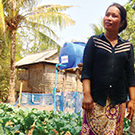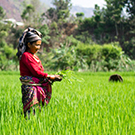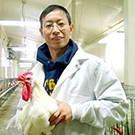Harnessing U.S. university researchers to solve global food security challenges
The Horticulture Innovation Lab is one of 21 Feed the Future Innovation Labs that leverage U.S. university research to advance agricultural science and reduce poverty in U.S. Agency for International Development (USAID) focus countries. The University of California, Davis, currently leads three of the nation's Feed the Future Innovation Labs, each with funding from USAID. (See full map image)
What is a Feed the Future Innovation Lab?
Feed the Future Innovation Labs are research programs that draw on the expertise of top U.S. colleges and universities in collaboration with research and educational institutions in focus countries to tackle some of the world’s greatest challenges in agriculture, food security, and nutrition. Led by U.S. universities, the Feed the Future Innovation Labs are on the cutting edge of efforts to research, develop, and take to scale safe and effective technologies that address current and future challenges posed by a weather extremes and the need to feed a growing global population. One important aspect of Feed the Future Innovation Labs is the collaborative partnerships they build across borders, accessing knowledge of American universities and building the capacity of scientists in developing countries.
Feed the Future Innovation Labs led by UC Davis
Teams at UC Davis lead Feed the Future Innovation Labs focused not only on horticulture, but also on agricultural economics (including insurance, assets and market access), poultry resistance to Newcastle disease and chickpea breeding. Visit each program's website for more information about their research, impact and partnerships:

Feed the Future Innovation Lab for Horticulture
Working across Africa, Asia and Central America, the Horticulture Innovation Lab is a global research network that advances fruit and vegetable innovations for farmers to earn more income while better nourishing their communities.

Feed the Future Innovation Lab for Markets, Risk and Resilience
Working across Africa, Asia and Latin America, the MMR Innovation Lab develops and tests financial and market innovations that take the most promising agricultural tools for families in developing economies from the lab to the field. Michael Carter is the director of this program (previously called the AMA Innovation Lab and also BASIS CRSP), which has been based in the UC Davis Department of Agricultural Resource and Economics since 2012.

Feed the Future Innovation Lab for Genomics to Improve Poultry
The Genomics to Improve Poultry Innovation Lab completed its research phase at the end of 2023. Research focused on advanced genetics and genomic approaches to enhance innate resistance to Newcastle disease and tolerance to heat stress, to improve the chicken production by households and smallholder farmers in Africa. Huaijun Zhou was the Director of this program, which was housed in the College of Agricultural and Environmental Sciences International Programs Office.
See a list of all Innovation Labs on the Feed the Future website.
History of Feed the Future Innovation Labs
and Collaborative Research Support Programs (CPSPs)
The programs currently called the "Feed the Future Innovation Labs" were originally called "Collaborative Research Support Programs" (or CRSPs). Support for these long-term collaborative research collaborations between U.S. universities and the U.S. Agency for International Development was authorized under Title XII of the International Development and Food Assistance Act of 1975. These programs focus the scientific expertise of U.S. universities to improve agricultural productivity and enhance food security. Learn more about Title XII from the Association of Public and Land-grant Universities.
In 2012, USAID announced a reorganization of U.S. university-led research programs aligned with Feed the Future, the U.S. government’s global hunger and food initiative. Under the reorganization, the existing CRSPs would each be renamed as a “Feed the Future Innovation Lab.” In addition to the CRSPs, a dozen other research programs led by U.S. universities and funded by USAID were also designated as “Feed the Future Innovation Labs.”
More information about CRSPs and Innovation Labs is available on the CRSP Digest Project website.
More about Feed the Future
Feed the Future is America's global hunger and food security initiative. With an emphasis on smallholder farmers Feed the Future supports a country-led approach to reduce hunger, poverty and undernutrition by promoting growth in the agriculture sector.
In partnership with other governments, civil society, development organizations, research institutions, universities, and the private sector, the U.S. government advances food security and improved nutrition by focusing efforts around three interrelated and interdependent objectives:
- Agricultural-led economic growth
- Strengthened resilience among people and systems
- A well-nourished population

